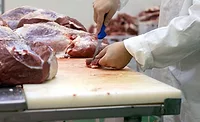Can Labs Give Us Safer, More Sustainable Meat?

Credit: Atelier Meats
Among the new and emerging food groups discussed in the Food and Agriculture Organization of the United Nations' report, "Thinking about the future of food safety: A foresight report,"1 is cell-based food production. Startups are taking advantage of lab-grown cell technology to produce cultivated meats, including Atelier Meats, a biotechnology company that is dedicated to producing quality, lab-grown meats. Atelier Meats has set up a multidisciplinary research and development (R&D) collaboration with experts at Rutgers University and its own experts to bring together advanced technologies in tissue engineering, cell culture, process development, and quality systems integration.
Technology Pathway
Food safety concerns are paramount in Atelier Meats' R&D work and underline its technology development and business plans. The company's technology for producing "structured meats" involves several components that can be simplified into three steps. The first is the isolation of a unique extracellular matrix (ECM) to serve as the scaffold for cultivated meat. This is followed by the development of novel and proprietary lines of stem cells—from the same species that Atelier isolates its ECM—that are easily culture expanded and differentiated. The third step involves the development of technology to populate the scaffold with cells to create high-quality structured, cultivated meats. Atelier does not employ genetic engineering in producing its cell cultures; rather, the cell cultures come from stem cells obtained from the various animal species from which Atelier Meats plans to produce meats.
Atelier Meats is currently in the R&D phase. As such, the company envisions production lines that include the three steps involved in its technology. These commercial production lines will operate in full compliance with the U.S. Food and Drug Administration (FDA) Current Good Manufacturing Practice (cGMP) regulations and the U.S. Department of Agriculture (USDA) requirements. Atelier intends to present its technology to FDA and USDA as it approaches its final testing phase. As the technology avoids genetic engineering, it will not produce any novel proteins. Key ingredients used in Atelier Meats' technology come from animal species whose meat people currently consume, and the media components that Atelier will use in its cultivators are generally recognized as safe (GRAS).
Food Safety Focus
In line with its emphasis on food safety, Atelier Meats has plans in place to address and mitigate the risks of potential hazards that could be introduced during the production of lab-cultivated meats. Its production lines will operate under aseptic conditions following food cGMPs, with strict quality controls to prevent any microbiological contamination. According to Atelier, this is one of the key benefits of cultured meat production compared to current agricultural methods of producing various meats, which are much more susceptible to microbiological contamination.
Atelier Meats' manufacturing operations will also follow cGMPs with written standard operating procedures (SOPs) to ensure the absence of any foreign materials in the final product. Atelier does not envision the use of any solvents or hazardous chemicals in its manufacturing processes, which will eliminate the risk of chemical residues. The company's SOPs will include quality control testing at various stages of production to prevent the presence of any chemical hazards in its final products.
Atelier Meats will employ the highest standards of cleanroom procedures for the culturing of cells and the final meats. Food quality and safety will be achieved by the use of a combination of closed systems, automation and environment and surface monitoring for adventitious agents. All steps in the manufacturing process, from the cells to the final product, will be conducted in closed systems in cleanrooms under a Class 100/Class 1000 environment (ISO 5-6) requiring continuous monitoring of air particulates. To avoid human contact, most steps in the manufacturing process will be automated. Cleanroom and equipment cleaning procedures will be established and procedures validated as per GMPs. Additionally, disposal of processing waste products will comply with all local and federal regulations.
To support its research efforts and planned commercial production, Atelier Meats has entered into a multiyear, multidisciplinary R&D agreement with Rutgers, The State University of New Jersey, to develop the proprietary technology for the manufacture of cultivated meats. Atelier also has analytical methods in place to examine cells for potential tumorigenicity and cell senescence—two health concerns that have arisen in relation to the production and consumption of lab-cultivated meats.
Looking for quick answers on food safety topics?
Try Ask FSM, our new smart AI search tool.
Ask FSM →
Sustainability Win
Current agricultural methods of producing various meats are responsible for the majority of detrimental environmental impacts including deforestation, land degradation, loss of biodiversity, global warming, and air and water pollution. More than three-quarters of agriculture land is used to support animals that provide only 18 percent of global food calories and 25 percent of protein.2 With a rapidly growing world population, this approach is not sustainable.
Cultivated meat technology, as employed by Atelier Meats, will address these impacts by conserving forests, land and water, preserving habitat and biodiversity, reducing greenhouse gas emissions, and preventing air and water pollution.
Food Safety Magazine thanks Rahim Rajwani, CEO of Atelier Meats; Mohit Bhatia, Ph.D., CSO and Co-Founder of Atelier Meats; and Maghsoud Dariani, Ph.D., COO and Co-Founder of Atelier Meats, for supplying the expert content for this article.
- Food and Agriculture Organization of the United Nations. "Thinking about the future of food safety: A foresight report." Rome, Italy. March 2022. https://doi.org/10.4060/cb8667en.
- Mottet, Anne, et al. "Livestock: On our plates or eating at our table? A new analysis of the feed/food debate." Global Food Security 14 (September 2017): 1–8. https://doi.org/10.1016/j.gfs.2017.01.001.







.webp?t=1721343192)